Table of Contents
The best anti-aging supplement supports your cells, reduces inflammation, and helps your skin, brain, and energy stay strong with age. NMN, Resveratrol, Collagen, and CoQ10 are among the top science-backed options.
While aging is natural, the right supplements can help you feel better, think clearer, and keep your skin looking fresh. Below, you’ll find the best anti-aging supplements and how they can support your daily routine.
NMN + Resveratrol
Cellular NAD+ booster with ultra‑pure NMN and Resveratrol, at research‑backed doses.*
Top 15 Anti-Aging Supplements
Here are some of the best anti-aging supplements that may help support healthy skin, energy, and longevity:
NMN (Nicotinamide Mononucleotide) – Supports NAD+ levels and cellular energy
Resveratrol – Fights inflammation and supports heart and brain health
Fisetin – Clears damaged cells and promotes healthy aging
Curcumin – Natural antioxidant with anti-inflammatory effects
EGCG (from Green Tea) – Boosts mitochondrial function and supports skin
Collagen – Improves skin elasticity, hydration, and joint health
Rhodiola – Helps manage stress and supports energy
CoQ10 – Supports energy production and heart health
Crocin (from Saffron) – Supports brain health and mood
Ashwagandha – Reduces stress and supports joint comfort
Vitamin C – Boosts collagen, skin repair, and immunity
Astragalus – May support immune function and telomere health
Vitamin E – Protects cells from oxidative stress
L-Theanine – Promotes calm focus and brain health
Sulforaphane – Supports detox and protects against age-related damage
1. Nicotinamide Riboside / Nicotinamide Mononucleotide (NR / NMN)
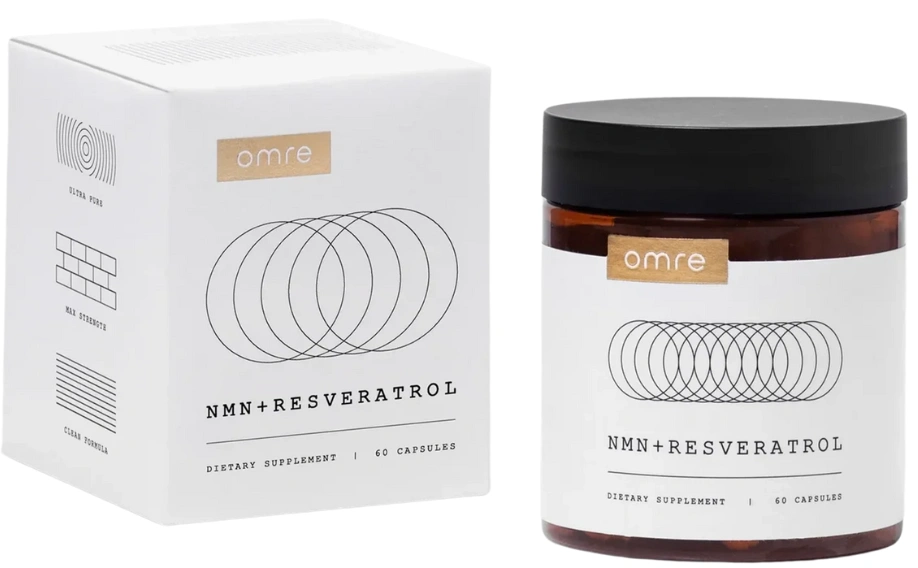 Nicotinamide riboside (NR) and nicotinamide mononucleotide (NMN) are known to help replenish NAD+ levels—a molecule your cells need for energy, DNA repair, and gene regulation. NAD+ declines with age, and low levels are linked to age-related issues, including physical decline and brain health concerns.
Nicotinamide riboside (NR) and nicotinamide mononucleotide (NMN) are known to help replenish NAD+ levels—a molecule your cells need for energy, DNA repair, and gene regulation. NAD+ declines with age, and low levels are linked to age-related issues, including physical decline and brain health concerns.
One study of men aged 75 found that supplementing with 1 gram of NR each day for 21 days boosted NAD+ levels in muscle and decreased inflammation markers (1).
Similarly, another study noted that NMN supplements significantly lengthened telomeres—DNA sequences associated with aging—in both humans and mice (2).
For a well-rounded NAD+ booster, OMRE’s NMN + Resveratrol supplement combines pure NMN with Resveratrol, designed to support cellular energy and longevity. It’s highly rated and available as a one-time or subscription option.
2. Fisetin
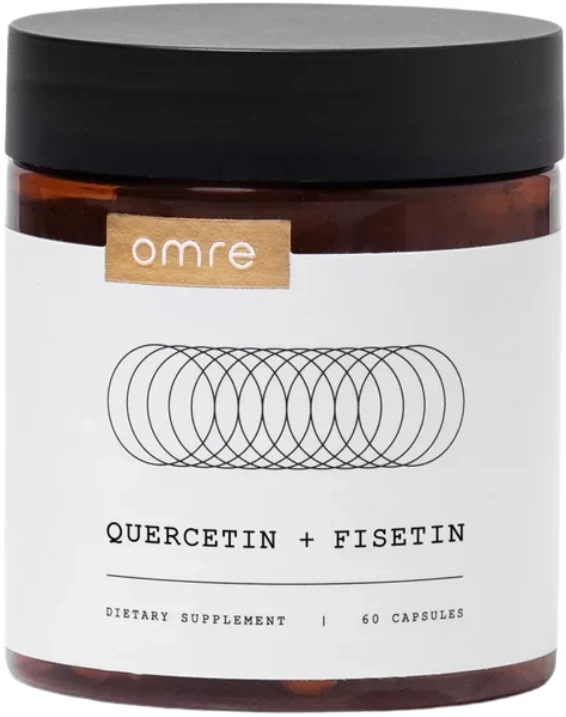 Fisetin is a natural compound with the unique ability to clear out senescent, or "zombie," cells—old cells that no longer function but still release inflammatory signals that can harm healthy cells.
Fisetin is a natural compound with the unique ability to clear out senescent, or "zombie," cells—old cells that no longer function but still release inflammatory signals that can harm healthy cells.
Animal studies show that fisetin helps reduce these senescent cells, which may improve tissue health and even extend lifespan (3) (4).
If you’re interested in this powerful duo, OMRE's Quercetin + Fisetin supplement provides a potent formula that supports cellular rejuvenation and is designed to help reduce aging markers and inflammation.
3. Curcumin
Curcumin, the active ingredient in turmeric, is known for its antioxidant and anti-inflammatory effects. As we age, cells naturally stop dividing in a process called cellular senescence, which can speed up aging. Curcumin has shown promise in slowing down this process, as it activates proteins that delay cellular aging (5) (6).
Animal studies even suggest that curcumin might extend lifespan and reduce age-related conditions. It’s no wonder that turmeric has been linked to a reduced risk of cognitive decline (7).
For daily use, you can try adding turmeric to your meals or taking curcumin supplements for a more concentrated dose.
4. EGCG
Epigallocatechin gallate (EGCG) is a powerful polyphenol found in green tea with benefits for both heart health and longevity.
EGCG helps rejuvenate mitochondria, the energy centers in our cells, which become less efficient as we age. It also stimulates autophagy, a natural process that removes damaged cellular material, helping cells stay healthy (8).
Studies have linked regular green tea intake with better skin health and less hyperpigmentation from UV exposure, while daily green tea may even reduce age-related stress in brain cells (9).
You can get your EGCG by drinking green tea or opting for a green tea extract supplement for a concentrated dose (10).
5. Collagen
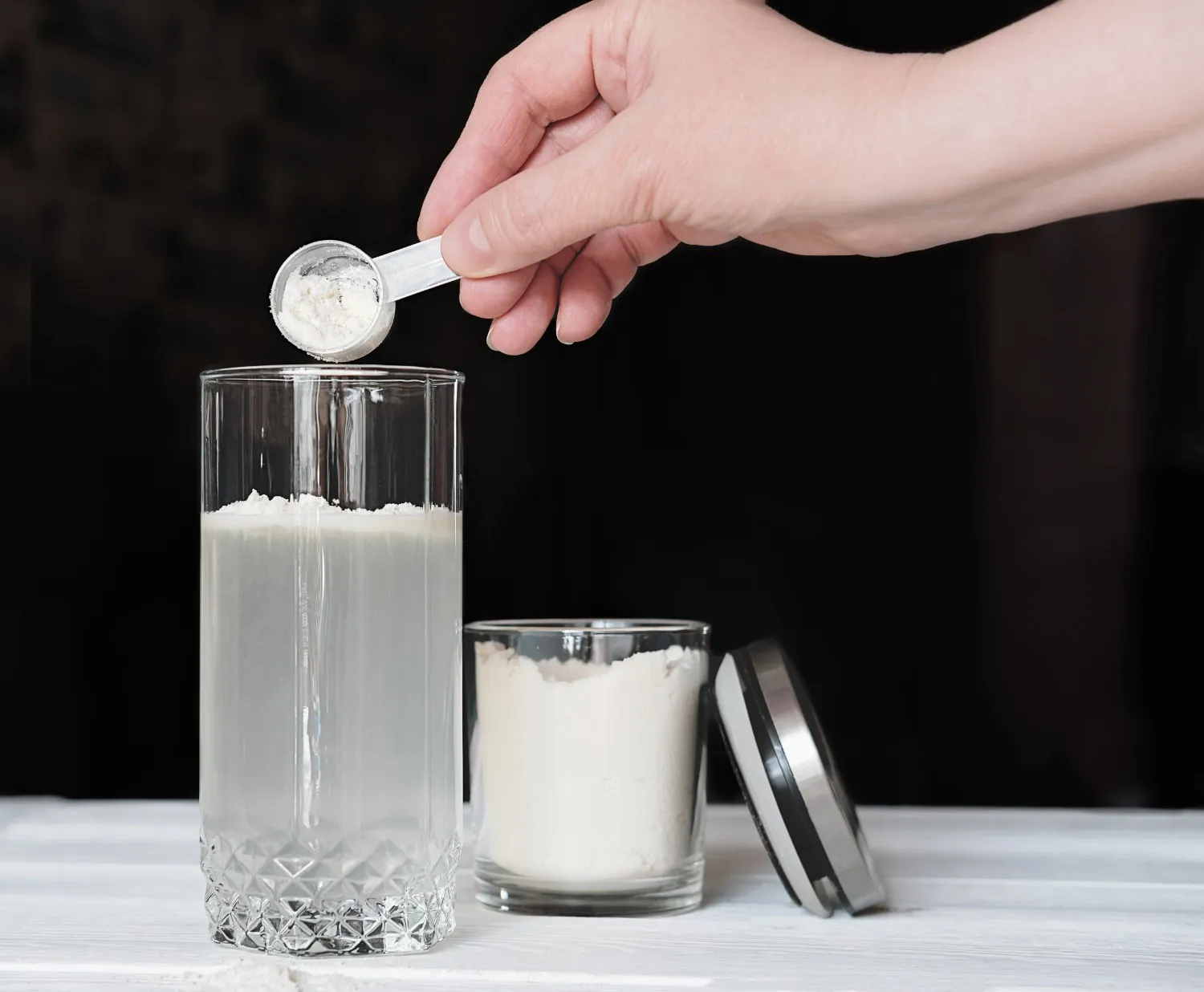 Collagen is essential for maintaining firm, elastic skin. However, collagen production decreases as we age, leading to more visible wrinkles and dryness.
Collagen is essential for maintaining firm, elastic skin. However, collagen production decreases as we age, leading to more visible wrinkles and dryness.
Studies show that collagen supplements can significantly improve skin hydration, texture, and elasticity. For example, in a study with 72 women, taking 2.5 grams of collagen daily improved skin hydration, smoothness, and elasticity (11).
This protein also supports joint and nail health, making it a popular choice for those looking to maintain a youthful appearance inside and out (12).
Collagen is available in various forms, such as powders or capsules, and can be easily incorporated into your daily routine.
6. Rhodiola
Rhodiola, a traditional medicinal plant, has gained popularity for its anti-inflammatory and potential longevity-promoting properties.
Animal studies indicate that rhodiola can help reduce inflammation and extend lifespan, though more human studies are needed to fully understand its effects (13) (14).
This herb is particularly valued for helping the body manage stress, which can be beneficial for both mental clarity and physical health as we age.
Rhodiola is available in supplement form, often combined with other adaptogens for an added benefit.
7. Resveratrol
Resveratrol is a polyphenol antioxidant found in foods like grapes, berries, and red wine. It’s known for activating sirtuins, enzymes that help regulate cellular health and longevity.
While human research is still ongoing, animal studies suggest that resveratrol may increase lifespan by protecting against cellular aging (15).
Its popularity largely comes from the idea that it may offer the benefits of red wine without the alcohol, targeting heart health and supporting brain function.
For those wanting the benefits of Resveratrol along with NAD+ support, OMRE’s NMN + Resveratrol supplement offers a powerful combination to help promote cellular health and longevity. With ultra-pure ingredients and enhanced absorption, it’s a top choice for supporting energy and healthy aging.
NMN + Resveratrol
Cellular NAD+ booster with ultra‑pure NMN and Resveratrol, at research‑backed doses.*
8. CoQ10
Coenzyme Q10, or CoQ10, is an antioxidant that naturally occurs in the body, playing a key role in energy production and cellular protection. As we age, our CoQ10 levels drop, which can impact our energy and contribute to the natural wear and tear on our cells (16).
Research supports CoQ10’s role in promoting better health in older adults; in one study with 443 participants over four years, CoQ10 and selenium supplements improved quality of life, reduced hospital visits, and slowed physical and mental decline (17).
Additionally, CoQ10 may help maintain heart health by lowering blood pressure, reducing arterial stiffness, and preventing oxidized cholesterol buildup.
Adding CoQ10 to your routine can be a smart choice, especially if you're looking to support your energy levels and cardiovascular health.
9. Crocin
Crocin, the vibrant yellow pigment found in saffron, is more than just a culinary delight; it has significant anti-aging properties. This carotenoid offers anticancer, anti-inflammatory, anti-anxiety, and even antidepressant benefits (18,19).
Research highlights its protective effects on nerve cells, where it prevents damage by reducing oxidative stress and inhibiting compounds that contribute to aging.
Animal studies have shown that crocin protects against nerve damage, while in test-tube studies, it helps prevent UV-induced cellular aging in human skin cells. Since saffron is quite expensive, crocin supplements can provide these benefits more affordably (20,21).
Crocin could be an excellent option for those looking to support brain health, mood, and skin protection as they age.
10. Ashwagandha
Ashwagandha, a traditional herb in Indian medicine, has long been used to support joint health, manage stress, and promote overall well-being.
Studies have shown that ashwagandha root extract can improve sleep quality, reduce stress, and support anti-aging effects by enhancing cellular function (22). It’s also known to provide benefits for joint health, as it supports joint lubrication, making it popular among those experiencing age-related joint discomfort (23).
If you’re looking for a natural way to help manage stress and improve joint health, ashwagandha is a great addition to your anti-aging routine.
11. Vitamin C
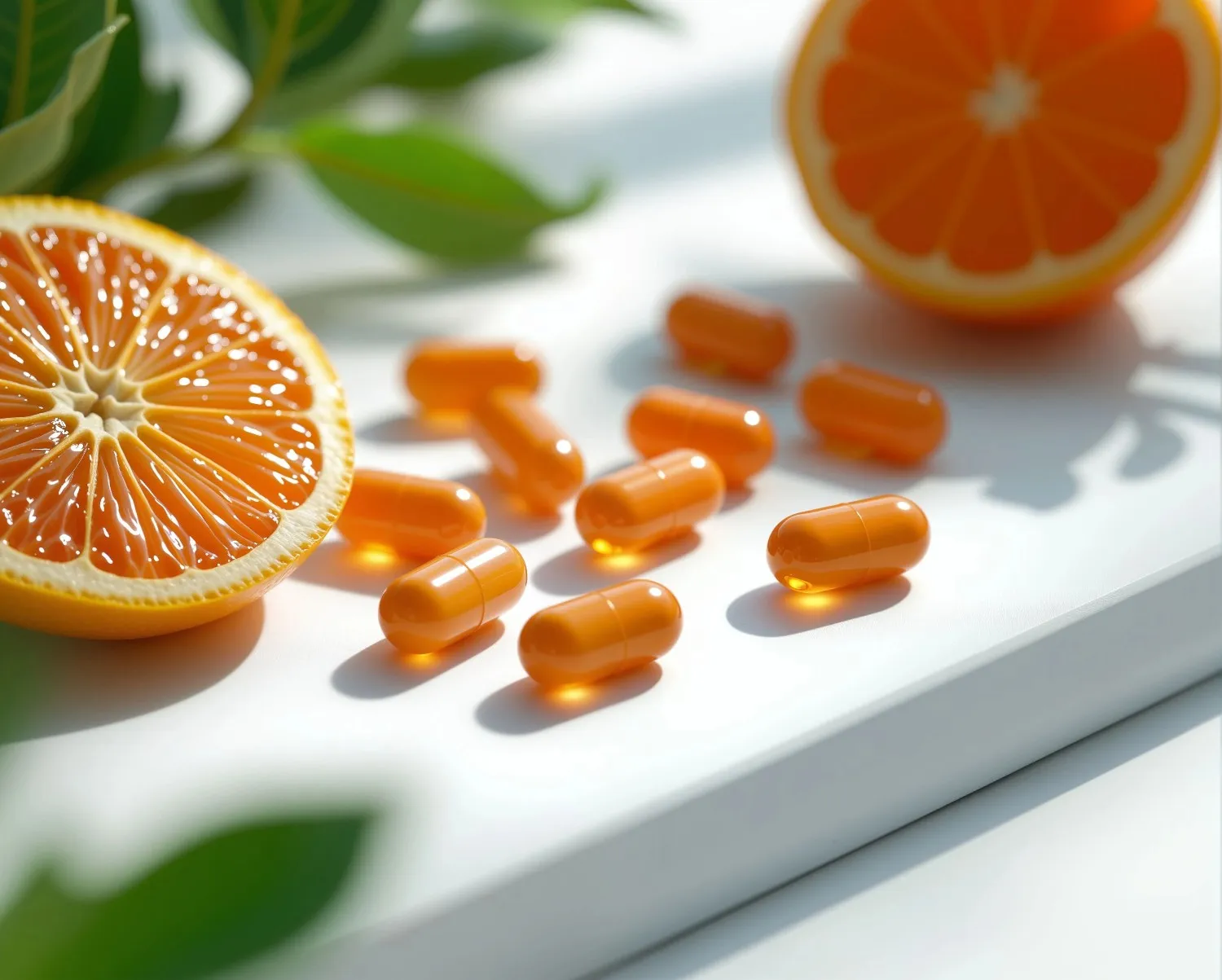 Vitamin C is a powerhouse antioxidant that protects cells from damage, regulates inflammation, and boosts immune health. It’s particularly important as we age because it can help guard against age-related conditions.
Vitamin C is a powerhouse antioxidant that protects cells from damage, regulates inflammation, and boosts immune health. It’s particularly important as we age because it can help guard against age-related conditions.
In a study with 80 adults aged 60, higher blood levels of vitamin C were linked to better focus, memory, and decision-making (24).
For skin, vitamin C encourages collagen production, improving hydration, elasticity, and resilience against wrinkles. It’s especially beneficial for older adults, who are more likely to have lower levels of vitamin C due to dietary changes.
Including vitamin C in your diet or as a supplement is a smart way to support both immune health and skin vitality.
12. Astragalus
Astragalus, an herb used in traditional Chinese medicine, is known for its stress-relieving and immune-supporting benefits. It’s believed to help slow aging by reducing oxidative stress, promoting immune function, and preventing cellular damage (25).
One fascinating aspect of astragalus is its potential to activate telomerase, an enzyme that protects telomeres—structures that safeguard our DNA from age-related damage (26).
Healthy telomeres are linked to a slower aging process, making astragalus a popular choice for anti-aging supplements. Astragalus is worth considering if you’re interested in immune health and cellular protection.
13. Vitamin E
Vitamin E is essential for immune health and helps regulate inflammation, both of which become more important as we age. Some research suggests that older adults need higher levels of vitamin E to maintain health and counteract age-related declines (27).
Vitamin E is also widely known for its skin benefits, protecting cells from oxidative stress and helping skin stay moisturized and resilient.
14. L-Theanine
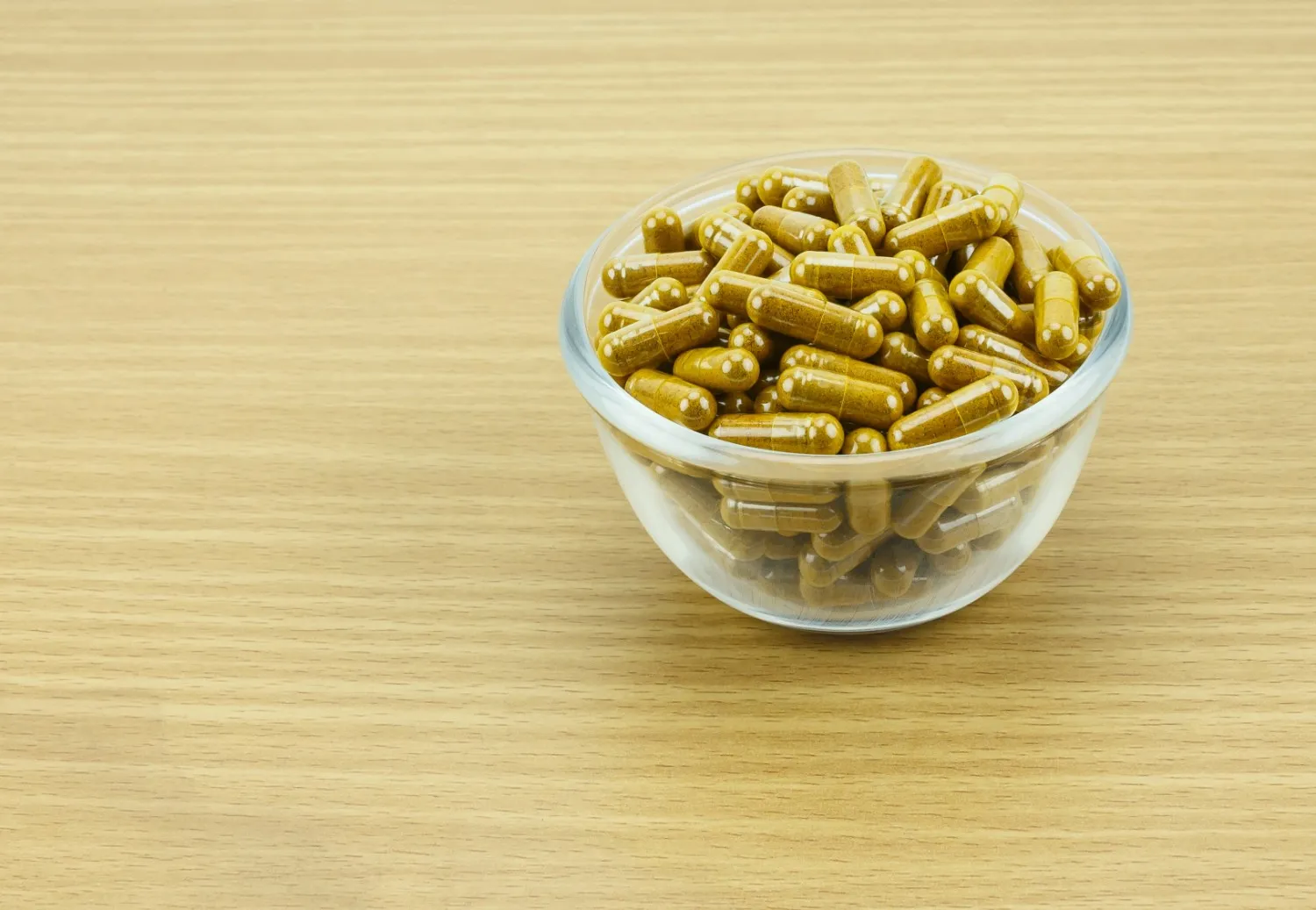 L-theanine, an amino acid found in green tea, is well-known for promoting calmness and mental focus. Studies suggest that L-theanine supports brain function in middle-aged adults and protects against oxidative stress, liver inflammation, and other age-related issues (28).
L-theanine, an amino acid found in green tea, is well-known for promoting calmness and mental focus. Studies suggest that L-theanine supports brain function in middle-aged adults and protects against oxidative stress, liver inflammation, and other age-related issues (28).
Unlike stimulants, L-theanine offers a relaxed focus, making it ideal for those who want to stay sharp without the jitters.
15. Sulforaphane
Sulforaphane is a compound found in cruciferous vegetables like broccoli and is recognized for its strong anti-inflammatory effects.
Research has shown it to be promising for longevity; recent studies found that it increased the lifespan of roundworms and reduced age-related heart problems in mice (29).
Sulforaphane also activates the body’s natural detox processes, which can be beneficial for keeping cells healthy and supporting overall wellness (30).
Incorporating sulforaphane, whether through diet or supplements, could be an effective way to support heart health and slow down the effects of aging.
What Causes Aging?
Aging is a natural part of life, but its pace and effects can be slowed with the right lifestyle habits and supplements. Genetics, environment, and lifestyle choices like diet and exercise all play a role in how quickly we age.
For instance, the genes you inherit might make you more prone to age-related diseases, while environmental factors like sun exposure and pollution can damage cells, causing them to age faster.
On the flip side, leading a healthier lifestyle — eating nutritious foods, staying active, and getting enough sleep — can help counteract these effects.
Research shows that several anti-aging supplements support your body’s natural defenses, reducing inflammation and cellular damage.
By making a few intentional choices and adding the right supplements, you can give yourself the best chance to feel vibrant and youthful for longer.
What to Look for in an Anti-Aging Supplement
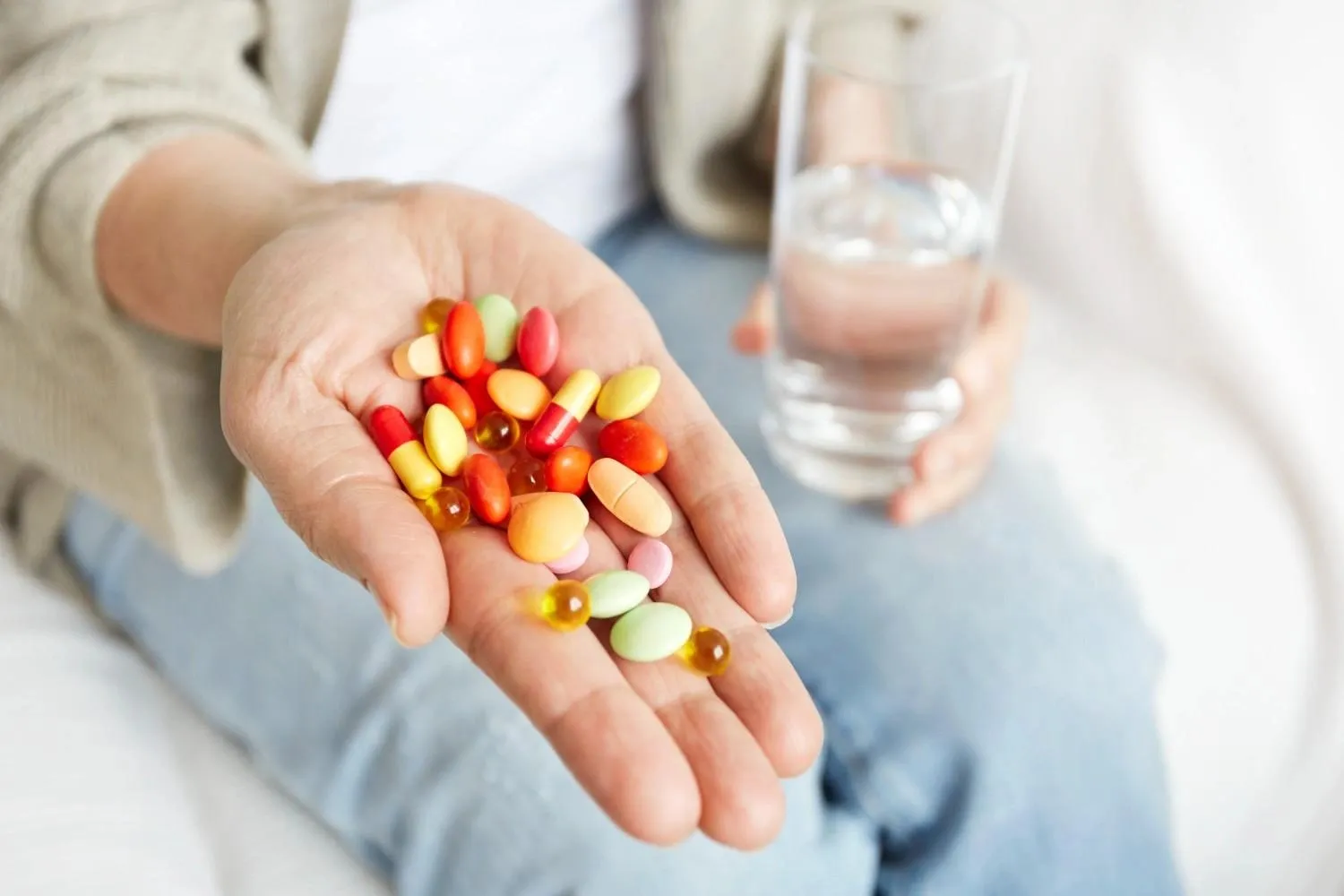 Choosing the right supplement can feel overwhelming with so many options out there. Here’s what actually matters when picking something that will support healthy aging.
Choosing the right supplement can feel overwhelming with so many options out there. Here’s what actually matters when picking something that will support healthy aging.
Natural, Clean Ingredients
Look for plant-based or naturally occurring compounds like NMN, turmeric, or green tea extract. Avoid anything with unnecessary fillers, artificial dyes, or long ingredient lists you can’t pronounce.
Clinically Studied Formulas
The best anti aging supplements aren’t just trendy, they’re backed by science. Check if studies support the claims, especially for things like improved skin hydration, cognitive function, or cellular repair.
Good Absorption
Some vitamins and compounds need to be combined with other ingredients or come in specific forms to be properly absorbed. For example, curcumin works better when paired with black pepper extract.
Third-Party Testing
It’s easy to slap a label on a bottle. That’s why third-party testing is so important. It shows the product actually contains what it says it does, with no hidden surprises.
Matches Your Goals
Are you looking to support skin health, boost energy, or protect your brain? Choose supplements that fit your personal needs, not just what’s popular.
Other Natural Ways to Slow Down Aging
Supplements help, but they work even better when paired with healthy habits. You don’t have to overhaul your life; just a few smart changes can go a long way.
Eat more plants – Leafy greens, berries, nuts, and whole grains are packed with antioxidants and nutrients that fight aging from the inside out.
Move your body – Even a daily 20-minute walk helps with blood flow, brain health, and joint mobility.
Sleep well – Your body repairs itself while you sleep. Aim for 7–9 hours of quality rest every night.
Protect your skin – Use sunscreen daily, even on cloudy days. Sun damage is one of the biggest causes of wrinkles and spots.
Cut stress when you can – Chronic stress takes a toll on your body. Try journaling, stretching, or just taking 10 quiet minutes to breathe.
Stay social and engaged – Spending time with people you enjoy helps your mood and keeps your mind sharp.
Conclusion
Aging may be a natural process, but with the right supplements, you can support your body’s defenses against its more challenging effects.
From enhancing cellular energy to keeping your skin smooth, these top anti-aging vitamins and supplements offer a range of benefits that can help you look and feel youthful.
Adding a few natural anti-aging supplements to your daily routine can support healthier skin, better focus, and more lasting energy as you age.
Suppose you’re interested in taking your anti-aging regimen a step further. In that case, OMRE’s supplements, like their NMN + Resveratrol and Quercetin + Fisetin formulas, offer high-quality options designed to support cellular health and longevity.
Check availability today to discover which OMRE supplement best suits your needs.
FAQs
How long does it take for anti-aging supplements to show results?
The effects of anti-aging supplements vary depending on the type and individual factors like diet and lifestyle. Some, like collagen, may show improvements in skin hydration and elasticity within a few weeks, while others, like NAD+ boosters like NMN, may take a few months to impact energy levels and overall wellness.
Are anti-aging supplements safe to take with other medications?
Many anti-aging supplements are safe when taken as directed. Still, it’s essential to consult your healthcare provider before starting any new supplement, especially if you’re taking medications or have existing health conditions.
Can I get enough anti-aging nutrients from my diet alone?
While a balanced diet can provide many nutrients beneficial for aging, certain compounds like NMN, fisetin, and sulforaphane are difficult to get in sufficient amounts from food alone. Supplements can help fill in these gaps to provide targeted anti-aging benefits.
At what age should I start taking anti-aging supplements?
There’s no fixed age for starting anti-aging supplements, as it depends on individual health goals and lifestyle. Generally, many people begin considering them in their 30s or 40s when natural levels of antioxidants, collagen, and cellular energy production decline.
Do anti-aging supplements work better if combined with a specific diet or lifestyle?
Yes, supplements can be more effective when paired with a healthy lifestyle. Eating a balanced diet, staying hydrated, exercising regularly, and practicing good sleep habits can all enhance the benefits of anti-aging supplements, helping you maintain overall wellness and slow aging.





